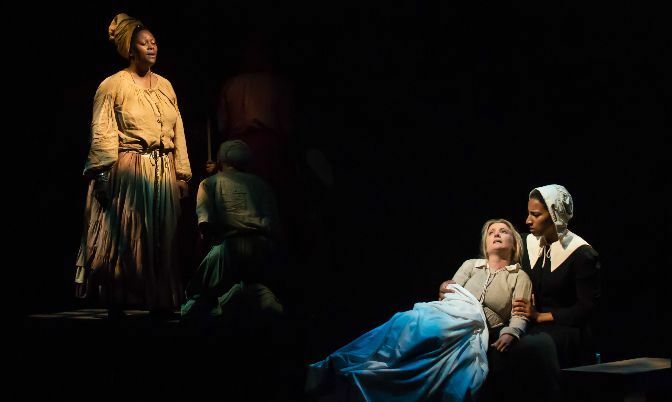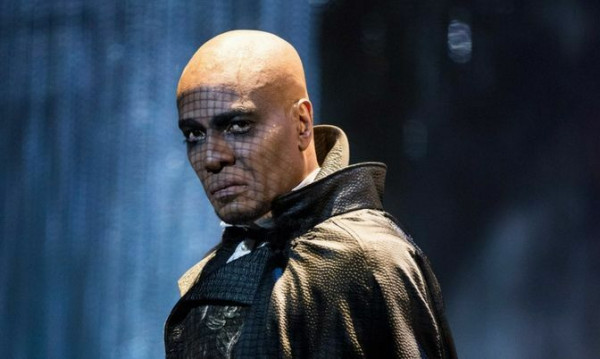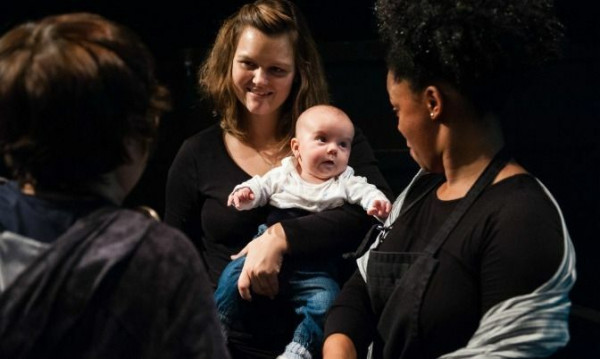In the 17th century, the Salem witch trials brought a dark cloud and much attention to Salem.
Though the story is well known, Tituba, a citizen of Salem, isn’t as popular. Tituba was a slave brought from Barbados to Boston and then to Salem, MA by Reverend Samuel Parris. She was also among the first group of women accused of witchcraft during the trial.
Creator, composer and librettist Nicole Brooks joins the list of storytellers bringing attention to Tituba, in her theatrical production “Obeah Opera”. Since 2009, the play has developed with the involvement of Culchahworks Art Collective, Nightwood Theatre and b current. The production, commissioned by PANAMANIA and presented by CIBC at Young Centre for the Performing Arts, features a female cast of 15 delivering an energetic performance consistent in quality despite the demands of singing a capella and dancing for two hours.
Obeah Opera is the story of the Salem witch trial from a Caribbean perspective, with Tituba’s practice of Obeah at the forefront. Slow to start, the plot begins to develop when Tituba (Nicole Brooks) arrives in Salem, and Betty Parris (Dana Jean Phoenix), daughter of Rev Samuel Parris (Janet MacEwen) and Elizabeth Eldridge (Sabryn Rock), takes ill. When the town’s doctor (Diana Coatsworth) nonchalantly resigns the child to death, Tituba uses Obeah to heal her.
Betty and the reverend’s niece Abigail Williams (Sarah Gibbons) become fascinated with Tituba and soon become rebellious. Puritan elders are not happy, concluding that the girls are possessed. The hunt to find someone to blame for the children’s devilish behaviour begins.

The play is more than a story about Tituba and the Salem Witch Trial. Beyond the woman, it’s easy to recognize the history of African spirituality and identity; societal conflicts and criticisms at play; and, the symbolism of Tituba. With song, dance and other cultural references, Brooks relays an image of Obeah many aren’t used to. When Tituba heals the reverend’s daughter, Brooks discards negative associations with the practice and focuses on its ability to heal. Due to this change in perception, some depth is sacrificed and Obeah seems more tame and approachable than it may be and would have been in the past.
Tituba’s unwillingness in the church to accept recognition for healing the child is an interesting comment on the town’s position on the occult: it does not belong in a Godly society. Nothing different belongs in the town. Such opposition is seen repeatedly in the play’s contrasting elements: Puritans vs Pagans; science vs nature; White vs Black; slave masters vs slaves. The scene where the Puritans sing “onward Christian soldiers marching off to war” and line up like soldiers to face the female slaves, summarizes the play’s conflicting tone.
Brooks does an amazing job in her on stage role. One of my favourite scenes is of her playing puppet to her puppeteering master. As a writer, her representation of Tituba is most appreciated. Tituba is every slave brought to the new world and forced to assimilate and discard their African beliefs. She speaks for the black individuals constantly questioning their African identity and ancestry. In addition to being a scape goat, Tituba is the punching bag the white slave owning ruling class uses to attack their fears and insecurities. When Puritan girls ask, “Who does she think she is?” it is also clear that this bold black woman is a threat to white dominance, masculinity and social order — an order condoned and upheld by religion. The town’s response to her is rooted in ignorance and intimidation. Like many people today who harmlessly exercise certain religious freedom, she is vilified for her beliefs.
Outside of Tituba, the heart and soul of the production is in the “Let me Testify” act. Ballads about African identity—featuring the gripping vocals of Divine Brown and Karen Burthwright—are interchanged with high spirited dance. Nickeshia Garrick, Melissa Noventa and Debbie Nicholls-Skerritt’s dance performances create the most raw and authentic feeling of the night. It’s hard to keep your eyes off these entranced women as they dominate the stage and transfix the audience. Nicholls’ powerful legs stomp and beat at the stage like a warrior fighting with the sound of her drum. The mix of tame and wild energy in that act is like a radio volume being turned on low then high repeatedly. Although I would have preferred the volume on high, I was moved by Anthony “Prime” Guerra’s choreography and the musical direction of Andrew Craig.
The impressive vocal range of the actresses is shown in the ebb and flow of folk, reggae, spiritual, soca, blues music throughout the night. Thanks to Graham Clarke, the clarity of such delivery is a pleasant experience. Every background effect, breath and word can be spotlessly heard.
Robin Fisher’s simple, rustic and open set design is complemented by Bonnie Beacher’s lighting, which effectively establishes various moods and time. The rope’s use as a shackle, noose and jail bars is evidence of the smart multipurpose ways props are used. The colourful and fitting costumes, especially that of The Elder (played by Singing Sandra), heightens interest in the play and many take on a life of their own during dance.
Despite the lag in plot movement and times where singing seems to interrupt the flow of the story, the actresses did a remarkable job telling the tale. Sarah Gibbons plays the devilish and malicious child well. It’s hard not to watch her with a feeling of contempt and chill. In contrast, Dana Jean Phoenix wins over the crowd with her sweet character as Betty. Singing Sandra is an intimidating presence on stage. Her voice and Caribbean accent add mysticism to the role. Unfortunately, this is where the play comes up short. Even though Caribbean dialect and some African language are represented in song, it would have more rewarding if Tituba’s character had an accent true to her identity, and all the actors’ speech represented the time.
The energy of the performers and symbolism of Tituba are the greatest take away. Brooks and the entire Obeah Opera team deserve the standing ovation received on opening night.
![[REVIEW] A Little Obeah Goes A Long Way](/media/k2/items/cache/07758ee08f7e16a0b15b0d98a56d204a_L.jpg?t=20200904_203126)





![[REVIEW] My Walk With The Postman](/media/k2/items/cache/46dab725dcec21832ff6fc55e05fcea7_S.jpg?t=20210129_193926)



